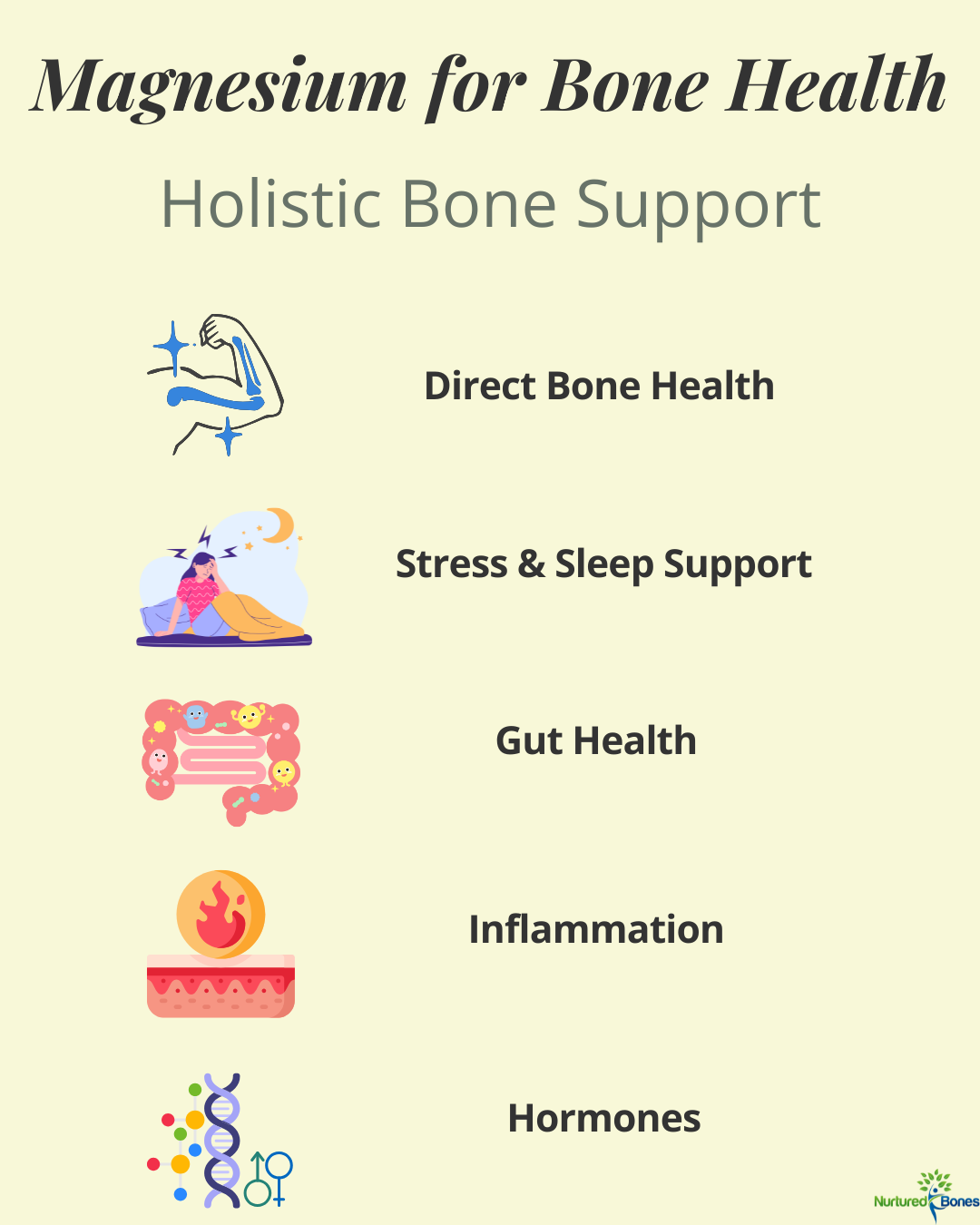Earlier this year, I wrote about the epidemic of magnesium deficiency. Today, I want to zoom in on why magnesium is so important for bone health — and how it supports your bones in ways that go far beyond calcium and vitamin D.

Magnesium is often called the “master mineral” because it’s involved in more than 300 processes in the body. Many of these directly affect your skeleton. From regulating bone metabolism to improving sleep quality, lowering stress hormones, supporting gut health, calming inflammation, and balancing hormones, magnesium is a true multitasker for your bones.
Unfortunately, most women over 50 don’t get enough magnesium. This shortfall can leave bones vulnerable, even if calcium and vitamin D intake look adequate. That’s why understanding magnesium’s role is so important for preventing osteoporosis and reducing fracture risk.
How Magnesium Strengthens Bones
About 60% of the body’s magnesium is stored in bone, where it helps regulate structure and mineralization. Magnesium also:
-
Activates vitamin D, allowing your body to absorb calcium (Rondanelli et al., 2021).
-
Supports parathyroid hormone (PTH), which maintains calcium balance.
-
Reduces urinary calcium loss, keeping more calcium available for your bones (Castiglioni et al., 2013).
Low magnesium intake has been linked to reduced bone mineral density and higher fracture risk, particularly in postmenopausal women (Orchard et al., 2014).
Magnesium, Stress, and Sleep: Indirect Pathways to Stronger Bones
Bone health isn’t only about minerals. Chronic stress and poor sleep both accelerate bone loss. Magnesium helps by:
-
Regulating cortisol, the stress hormone that weakens bones when elevated.
-
Calming the nervous system through GABA, the brain’s relaxation signal.
-
Supporting melatonin production, improving sleep quality, so bones have time to repair.
Better stress control and restorative sleep indirectly protect your skeleton.
Magnesium and Gut Health
Your gut is the gateway to nutrient absorption, and magnesium is part of that process:
-
Helps intestinal muscles contract and relax, preventing constipation.
-
Supports absorption of calcium and vitamin D.
-
May influence gut microbiota balance, reducing inflammation that accelerates bone breakdown.
Magnesium and Inflammation
Chronic, low-grade inflammation is one of the hidden drivers of osteoporosis and other chronic conditions. Inflammation stimulates osteoclasts — the cells that break down bone — tipping the balance away from bone building and toward bone loss.
Magnesium helps calm this process by:
-
Lowering levels of C-reactive protein (CRP), a key marker of inflammation in the body.
-
Supporting a balanced immune response, so inflammation doesn’t spiral out of control.
-
Helping regulate blood sugar and insulin, which in turn reduces inflammatory stress on the body.
Studies show that people with higher magnesium intake consistently have lower markers of inflammation (Nielsen, 2018). By reducing inflammation, magnesium not only protects bone health but also supports your heart, brain, and overall well-being.
Magnesium and Hormones That Affect Bone Health
Magnesium supports a range of hormones tied to bone metabolism:
-
Parathyroid Hormone (PTH): Regulates calcium balance.
-
Vitamin D (active form): Requires magnesium to convert into calcitriol (Rosanoff et al., 2012).
-
Estrogen & Testosterone: Magnesium helps regulate enzymes that support these sex hormones, which protect bone density.
-
Cortisol: Magnesium helps regulate the stress response, reducing excess bone loss.
-
Insulin: Improves insulin sensitivity, stabilizing blood sugar and lowering inflammation.
Best Food Sources of Magnesium
Most women fall short of the recommended 310–320 mg/day. You can easily boost your intake with foods such as:
-
Pumpkin seeds
-
Almonds and cashews
-
Spinach and Swiss chard
-
Black beans and lentils
-
Avocados
-
Dark chocolate
-
Whole grains (quinoa, oats, brown rice)
Magnesium Supplements for Bone Health
Food should always be the foundation, but supplements can help fill gaps.
-
Look for magnesium glycinate or citrate (better absorbed, gentler on digestion).
-
Typical dose: 250–400 mg/day.
-
Be mindful that high doses of magnesium oxide can cause digestive upset.
The Holistic Picture
Magnesium isn’t just another nutrient on the list — it’s a multi-tasker that helps bones through metabolism, sleep, stress, gut health, inflammation, and hormone balance.
That’s why magnesium is such a powerful example of why bone health requires a holistic approach. Strong bones aren’t built from calcium alone — they require multiple nutrients, lifestyle practices, and balance across the whole body.
In the BONES Method™ Program, we go beyond calcium and vitamin D to look at all the nutrients and lifestyle factors that influence bone strength — magnesium included. You’ll also learn how to evaluate supplements, understand lab testing, and put everything together in a step-by-step plan that works for you.
Enrollment is now open at the Early Bird price of $249. Join here: The BONES Method Program


